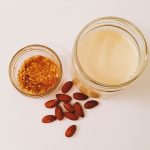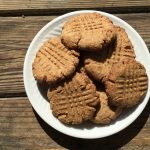When someone asks me about my thoughts on sugar, they need to be prepared for their ears to be talked off. One of my favorite nutrition topics is blood sugar balance. I even bought my own blood glucose kit so I could see what my own blood sugar was doing (amazing bio-hacking tool, by the way!).
Sugar is very complex. “Stop eating sugar” is not advice I give without thoroughly explaining what sugar is. And even then, I would never tell people to stop eating sugar because yes – I eat sugar! I have to laugh when people assume I just eat salads all the time because I am a nutritionist. I eat sweets every now and then, and I have dreams of being in dessert heaven where I can eat all of the double fudge brownies I want. Nutritionists need balance too, and in my opinion, that includes dessert. Perhaps the difference is that I don’t usually reach for candy bars. I mostly make my own sweets at home with high quality ingredients and minimally-processed sugar. I could spend a lot of time on Instagram scrolling through pictures of vegan desserts, sugarless baked goods, and nice-cream posts. These desserts hit the spot without sending me on a sugar binge.
Because sugar is so highly advertised in our society, in so many foods, and has caused many Americans to become obese and diabetic, I want to take some time to explain sugar and how it affects the body. Throughout the next couple of months, I will be giving you a front row seat to The Sugar Show, including helpful tips for reducing sugar cravings and recipes that will satisfy your sweet tooth. Let’s start from the beginning.
What is Sugar?
Sugar is a carbohydrate that is broken down into glucose, one of the main sources of fuel for the body (the other is fat). Sugar is in sweets, milk, alcohol, vegetables, fruits, and grains. But when we think of sugar, we commonly think of the sweet stuff. Many packaged and processed foods have added sugar – even things you wouldn’t think would have sugar, such as canned soups, deli meats, and crackers. If you are looking to reduce your sugar intake, start checking labels (including reading the ingredients list) and incorporating more whole foods (fruits, veggies, grains, quality meats, healthy fats).
Since sugar goes by so many names and is found in so many products, it can often be difficult to know if and when we’re eating too much sugar. This is why I recommend a mostly whole foods diet and reading labels. Below are some common names of sugar that you might see on a label (many of which are highly processed):
- Agave
- Brown Sugar
- Cane Sugar
- Cane crystals
- Coconut sugar
- Corn syrup
- Fructose
- Fructose sweetener
- Evaporated cane juice
- Fruit juice concentrates
- Honey
- High fructose corn syrup
- Glucose
- Lactose
- Maltose
- Raw sugar
- Malt syrup
- Maple syrup
- Molasses
And that’s not even an exhaustive list! To clarify, these types of sugars spike our blood sugar dramatically and don’t always respect our waistline (stay tuned for how sugar converts to fat). While some of them, like honey (in raw form) and coconut sugar can provide nutrients and other health benefits (such as relief from allergies), they do can have a big impact on your blood sugar.
The Sugar Our Bodies Need vs. the White Stuff
I often hear people say they are on a “low carbohydrate diet.” Don’t even get me started on the word “diet.” This nutritionist is on a non-diet. “Low carbohydrate” is misleading because there are two types of carbohydrates, one of which the body really needs. Complex carbohydrates are found in veggies, fruits, nuts and seeds, and legumes, while simple, or refined, carbohydrates, are found in sugar, candy, pastries, breads, rice, and pasta. Our body needs and functions more optimally on the sugar from complex carbohydrates as this is what gives us energy. So what’s the difference between the two, if glucose is the end result? The difference is in (1) how it affects blood sugar levels and (2) the nutrient profile.
How Complex Carbohydrates Affect Our Blood Sugar Levels
Complex carbohydrates are broken down slowly by the body and provide a slow and steady stream of sugar to our blood. They contain fiber, minerals and vitamins. Refined/simple carbohydrates send a bunch of sugar straight to the blood, spiking blood sugar levels. To learn more about why it is important to keep blood sugar levels stable, click here.
The Nutrient Profile of Complex vs. Refined Carbohydrates
Consuming a 20oz soda has the same amount of calories as 4.5 cups of broccoli, yet the soda only provides our body with calories while broccoli provides our bodies with potassium, carbs, proteins, and fiber while at the same time slowing down the digestive response and providing the recommended daily intake for vegetables. Broccoli (and many other fruits and vegetables) also helps to detoxify the body and reduce inflammation. So instead of doing low-carbohydrate, try smart-carbohydrate.
I could talk on and on about sugar, as I’m sure you have already concluded. If you would like to learn more about how sugar might be affecting your health as well as receive support in kicking your sugar habit, contact me.
In the meantime, one thing you should know about me is that I love pancakes. And furthermore, I love being able to eat them. I’ve invested many of my Sunday mornings concocting pancakes from various ingredients and have discovered that it is possible to make delicious pancakes without gluten, dairy, or sugar!
Try these hotcakes for yourself and let me know in the comments below what you think of them!
Oatmeal Cinnamon Pancakes
Ingredients
Makes 2 medium-size pancakes.
- 1/2 banana
- 1 egg
- 1/4 cup gluten-free old-fashioned oats
- 1 tablespoon brown rice flour
- 1/2 teaspoon baking powder
- 1/2 teaspoon cinnamon
- 1 tablespoon coconut oil
Instructions
- In a medium bowl, mash the banana until most chunks are smoothed out.
- Mix in the egg, oats, flour, baking powder and cinnamon.
- Heat a flat pan on medium low. Add coconut oil.
- Once hot, divide the batter in half and add to the pan for two pancakes. Cook for 1-2 minutes on each side (or until golden brown). Top with fruit, nuts, coconut cream, etc. These cakes are usually sweet enough on their own without syrup!





These pancakes are so good! Thanks for sharing!
Thanks, Kyle! Glad you liked them!